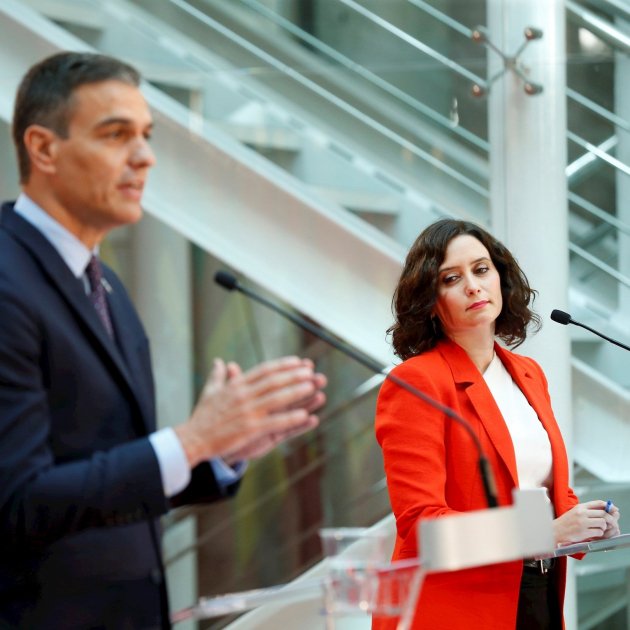It has taken a long time, but finally, Spain's central government has decided to take action in the Community of Madrid, overwhelmed by the coronavirus second wave. Yesterday, the Madrid high court overturned the perimeter confinement measures in the Spanish capital and Isabel Díaz Ayuso's regional government returned to its initial position: inflexibility. Given this, the Pedro Sánchez government met urgently this Friday and passed a cabinet decree declaring a state of alarm for at least two weeks. That's the same emergency status that the Spanish government used to impose centralised lockdown on the whole country in the first wave of the pandemic. Now, with control for public health having been returned to the autonomous communities, it is applied just to the Community of Madrid. It will be accompanied by a major police deployment involving 7,000 officers.
Health minister Salvador Illa explained that the perimeter confinement measures will be "exactly the same" as they were up until yesterday, but "with a different legal backing". They will come into effect immediately. As reported by the Spanish government, "as soon as the cabinet meeting is finished the measures will be sent to the official government gazette for publication." They will affect the same nine municipalities, with the exception of Alcalá de Henares, which has improved its figures. The health ministry is confident that two weeks will be enough.
But as well, the Spanish interior minister has announced a large police operation, with more than 7,000 members of the National Police and Civil Guard to control entry to and exit from these municipalities.
Presenting the plan this Friday, the health minister gave a "chronology of events" to show that the Spanish government has tried to fight the virus while "the president of the Community of Madrid has decided to do nothing". And he reviewed some data: 63 deaths in the last week, 3,631 hospitalized or "498 people in the ICUs fighting against life and death." He stated that, in Madrid, there is community transmission and mentioned how cities such as Paris and Berlin have acted more quickly with much lower virus incidence. Asked if the government was intervening too late, he avoided an answer. And he concluded by raising the tone: "Patience has a limit. There is none so blind as one who refuses to see."
Sanchez-Ayuso calls
Before today's special cabinet meeting began, prime minister Sánchez spoke by telephone with Ayuso. The president of the Madrid region asked for even more time. The PM replied that "public health must be protected now, and the state of alarm will be passed," according to sources in the Spanish executive, who add that over the next two weeks, the two government teams will continue to discuss the scenarios.
Yesterday Pedro Sánchez spoke twice with Isabel Díaz Ayuso. The Spanish leader gave the president of the Community of Madrid three options to respond to the Madrid court's veto on the legal method for enforcing perimeter confinement. The first was for the Community to issue a new order under the law on special public health measures. Second, for the Community to request the declaration of the state of alarm. And thirdly, for the Spanish government to declare it without prior request.
Justice, inconsistent
It’s not just a stock phrase: justice is really not the same for everyone. Yesterday, the Madrid high court overturned perimeter confinement in the Spanish capital and nine municipalities in its metropolitan area. Instead, its counterpart in the autonomous community of Castilla y León ratified identical measures for the cities of León, Palencia and San Andrés del Rabanedo. According to the court in the large northern Spanish region, the orders are "intended to contain the pandemic." Reacting to the same text, the Madrid court saw basic rights being damaged.
The Castilla y León government has decided to apply confinement measures because the three municipalities have a cumulative incidence of more than 500 cases per 100,000 inhabitants over the last 14 days, a positive PCR of more than 10% and a level of employment of ICUs greater than 35%. In the case of León, a city with population over 100,000, the measures which the Spanish health ministry initially agreed with the Community of Madrid are legally applicable. In all three municipalities entry and exit are to be restricted, except for the exceptions provided for in the order.
Same measures in Madrid
According to the document passed today, Madrid will be required to enforce the same measures as a "minimum" as it did until yesterday. Among these, the closure of the city perimeters, minus the exceptions which are allowed (for work, school, caring for a person or medical visits), a maximum gathering size of six people, the closure of commercial premises at 10pm with 50% of normal maximum occupancy allowed; on terraces, this maximum capacity will be 60%. Bars will have to close at 11pm, and after 10pm they will no longer be able to accept new customers.
